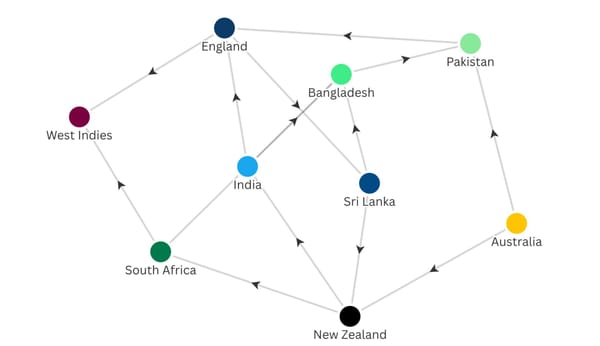The surprising Daryl Mitchell
He wasn't supposed to play in this series.
Daryl Mitchell wasn't supposed to be playing in this series. He was in the squad but as a backup batter. Mitchell was coverage, the guy that was so easy-going and unflappable you can just plug and play him into any role. That is his main use, as a utility batter, as one squad member he can kind of cover New Zealand from number three through to Colin de Grandhomme's role as a number seven who bowls wobblers.
But then Henry Nicholls was out with Covid, and Mitchell was dropped into the middle order. Remember other than a single warmup game, he had been in the IPL. His last first class game was on the 25th of February against South Africa. He wasn't prepared, he wasn't supposed to play, and he should have won the game for New Zealand.
There is just something about Daryl Mitchell.
At the start of Osman Samiuddin's article on Mitchell, he talks about how he might be the most Kiwi player ever. It is a fair question, but also a crowded field. So I have made this handy checklist.

Is he underrated? Well, yes. It took him 210 domestic cricket games to get an international call-up. Really until his World Cup heroics in the semi-final he was still just seen as another New Zealand all rounder. Even now, after seeing his last two hundreds, I am not sure he's that good.
He was very unknown for a long time. I mean he wasn't even the most famous Daryl Mitchell. That was Worcestershire stalwart Daryl Mitchell. When New Zealand's version played international cricket Worcestershire's Daryl Mitchell became the PCA's chairman to continue hog the limelight. Also, New Zealand's Daryl Mitchell doesn't look that crickety. If you met him on an all-inclusive holiday by the kids pool, and he told you he was a cricketer, you'd think he was a club player.
One thing that is very New Zealand is medium pace bowling. Currently I am commentating with Craig McMillan and Jeremy Coney for SEN.
Day Two of #ENGvNZ about to start on the SENZ network and the SEN app. Match recap from 9pm with @NikeshRughani, @norcrosscricket, @henrymoeranBBC, @cmacca10, Jeremy Coney and @ajarrodkimber to join you from 9:30pm.
— SENZ (@SENZ_Radio) 8:59 AM ∙ Jun 11, 2022
Both batters, both medium pacers. Other countries produce off-spinners as their part timers, the Kiwis are all over the slow wobblers. When he was in this team he wasn't even the only one, they had de Grandhomme as well.
Another key ingredient is being related to another cricketer. And sadly, here Mitchell lets us down. But he actually does ok on a technicality, as his father was an All Blacks player and coach. On balance, I think he gets this one as well, because this close enough. It's like you're not really a New Zealand athlete if you aren't related to another one.
Then there is utility. Legendary kiwi player John Reid started as a keeper before becoming a batter and the main spinner. The idea of any New Zealand player is to try and make themselves as useful as possible. Mitchell seems to be completely open to that. If you told him he had to replaced Trent Boult or Ajaz Patel, you'd see him in the nets bowling left armed.
And the final was is overseas. While England gets a lot of flak for picking players not born there, the New Zealand side is often a rainbow coalition. They often seem to have an incredible abundance of southern African players. But historically, many Asian born cricketers turn up for them, and there is almost always an aussie in the team. Mitchell was born in New Zealand but played for West Australia under 19s. And not only did he live in the UK when he was young.
But it's that bit on Australia I want to talk about. Because it tells you something about why Mitchell is so good. It wasn't just Australia he played in, but Western Australia, with it's hard fast pitches and hard fast bowlers. So he was trained for pace at him right there.
Then he goes to New Zealand again and plays professionally for Northern Districts. It means that just as he was developing on the yellow tracks of Perth, he changed to the green tracks of Hamilton. Weirdly enough though, Seddon Park is a slow-turning wicket. It's still new Zealand and not Galle, spinners average 39 there in first class cricket for instance. But it's the place in New Zealand where you face more turn than anywhere else.
That means Mitchell has been given the kind of development many players do not. Multi-faceted. Most players get one environment; he's had a little of everything.
And on top of that, he wasn't chosen when he was young and working out his game. He spent years getting better. It's good he wasn't chosen early, because I don't think he would have made it.

Those who saw him in that earlier incarnation said that pace was never really the problem, especially on the backfoot, but he struggled with the moving ball and spin.
You can see parts of it still in his game. His backlift does come from second slip at times. That can be a problem when the ball is moving away. To counter that he seems to wander down the wicket, and also uses his height to get on top of the ball. Perhaps that is something he has done to ensure he's not as weak around that length ball outside off. His strong drives to balls others wouldn't mean hitting that length against him can be expensive.
In Tests so far he's actually averaged more against spin than pace.

Which considering his original shortcomings is something else. In his only Test in Asia he made a decent 60 against India at Wankhede. But was taken by Axar Patel twice in that match. It would make sense long term that he might struggle with the ball spinning away because of his second slip bat path. But to get over it it launches down the ground with power and reverse sweeps to annoy the bowler.
The more I think about Mitchell, the more I see a player who completely knows his game. He always knows his scoring options. He gets on top of it to drive if you bowl an annoying length. If you go short, he pulls. If you're toss it up, he comes down, if you're making it hard with him he reverses. He is willing to come down the pitch to the quicks to upset their length. He sometimes shuffles outside off to negate LBW as well.
This might make it seem like he's not in control. Or that his mind is scattered. But it's the opposite. He keeps choosing the right options. And when he does it, there is no panic or thought that he's unsure. He simply thinks this is the time to do this, and he executes with a clear mind.
In the last T20 World Cup, they made him open the batting. This is such a bizarre thing, as he had never done it before, and New Zealand had other openers available to them. But they picked him, and it worked so well he put them in the final. It feels like there is no job Mitchell wouldn't do if asked. Knit Gary Stead a sweater, sure. Write erotic haiku's for Neil Wagner, done. Compose an email to Kane Williamson without using the phrase, "Hope you're well", on it.
Daryl Mitchell wasn't supposed to be opening the batting at the World Cup. He wasn't supposed to be playing in this series. He wasn't supposed to be this good against spin. He wasn't supposed to be anything more than a decent batter with some handy medium pace.
And yet as we sit here, mid way through his 11th Test, he is averaging 54, and he saved New Zealand at Lord's and made Stuart Broad and Jimmy Anderson look even older than they are at Trent Bridge.

You might think, well, this won't last. He's just in some good form, and it will end. But he was quite obviously never supposed to be like this. Even if Daryl Mitchell does go back to being a regular human Test player after this. This is probably a peak that a late-blooming all rounder that was in the team almost accidentally never thought he would have.
So far in his career, the most consistent and amazing thing about Mitchell is his ability to surprise.




